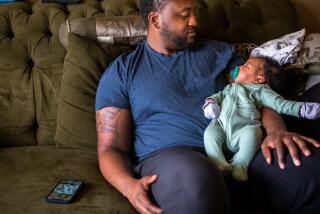‘Family’ Issues Affect Fathers as Well as Mothers
- Share via
The “family” rhetoric of both the Clinton and Dole campaigns is clearly aimed at women voters, and at the gender gap that Democrats want to widen and Republicans want to bridge. Men, it’s believed, just tune out on this issue.
But if men aren’t listening to the family policy debate, they ought to be. New research shows that men’s health is as profoundly affected by family issues as women’s--sometimes more so. Family leave, workplace flexibility and “family friendly” corporate policies are critical to men’s lives.
For example, our new study of full-time employed couples produced a surprising finding. A man’s concerns about his children have a significant, and negative, impact on his physical health, while his problems on the job do not. The more fathers worry about whether they’re doing the right things as parents, or about trouble their children are getting into, the more they are bothered by fatigue, sleeplessness, back problems and other physical complaints. But we still worry mainly about men’s stress on the job and see family as women’s concern.
When Hillary Rodham Clinton mentioned workplace flexibility in her convention speech, most listeners probably assumed she was talking to women. Ever since “mommy track” became the subject of a national debate a few years ago, workplace flexibility has been most often discussed as a women’s issue. But new research shows it may be even more important for men.
Control over work hours is critical to a man’s health. A 1991 study of working couples by researchers at Virginia Polytechnic Institute looked at a number of variables in men’s lives and found that flexibility on the job had the greatest impact on their health. Having enough time to deal with their families was linked to less distress on the job and in their marriages and to fewer physical problems. In fact, one study shows that flexibility--or the lack of it--has more impact on men’s health than on women’s.
And men do want more flexibility. In recent studies at major companies, nearly half the men surveyed said that they would trade pay and promotion for more family time.
Fatherhood has become more central to men’s lives. Both political party conventions featured TV close-ups of men dandling babies, and while those images may have been orchestrated for political impact, they do reflect reality. Fathers in working couples spend as much time parenting as mothers by the time their kids reach school age, and fathers are more vulnerable than mothers to “separation anxiety” when they drop their kids off at day care or school.
This closeness has its pluses and minuses. Problems with kids take a greater toll, but the joys of fatherhood offer great rewards. A man who thinks caring for children ought to be his wife’s job experiences heightened stress when he does child care. But a father who thinks taking care of the kids is just part of his job not only has less stress but gets a psychological boost from nurturing his children.
Also, men don’t just “shut off” their home problems while they are at work. It’s often men, more than women, who bring their home problems to work with them. Researchers Ronald Kessler of the University of Michigan and Elaine Wethington of Cornell discovered, in a major study of couples, that while the women could avoid “stress contagion” from home to work, the men could not. Why? The researchers speculate it’s because women expected to juggle a lot of jobs while men didn’t expect to be so involved with home and kids.
But will these new realities mean that men will stop “tuning out” when politicians mention the family? Probably not, because men have been so conditioned to regard family as “women’s turf” in the political arena. But if men don’t get involved, if such issues as family leave and flexibility remain women’s issues, they won’t be taken seriously and will be forgotten once the election is over.
It’s clear that men have a real stake in the family debate--nothing less than their own lives and health.
More to Read
Get the L.A. Times Politics newsletter
Deeply reported insights into legislation, politics and policy from Sacramento, Washington and beyond. In your inbox twice per week.
You may occasionally receive promotional content from the Los Angeles Times.










